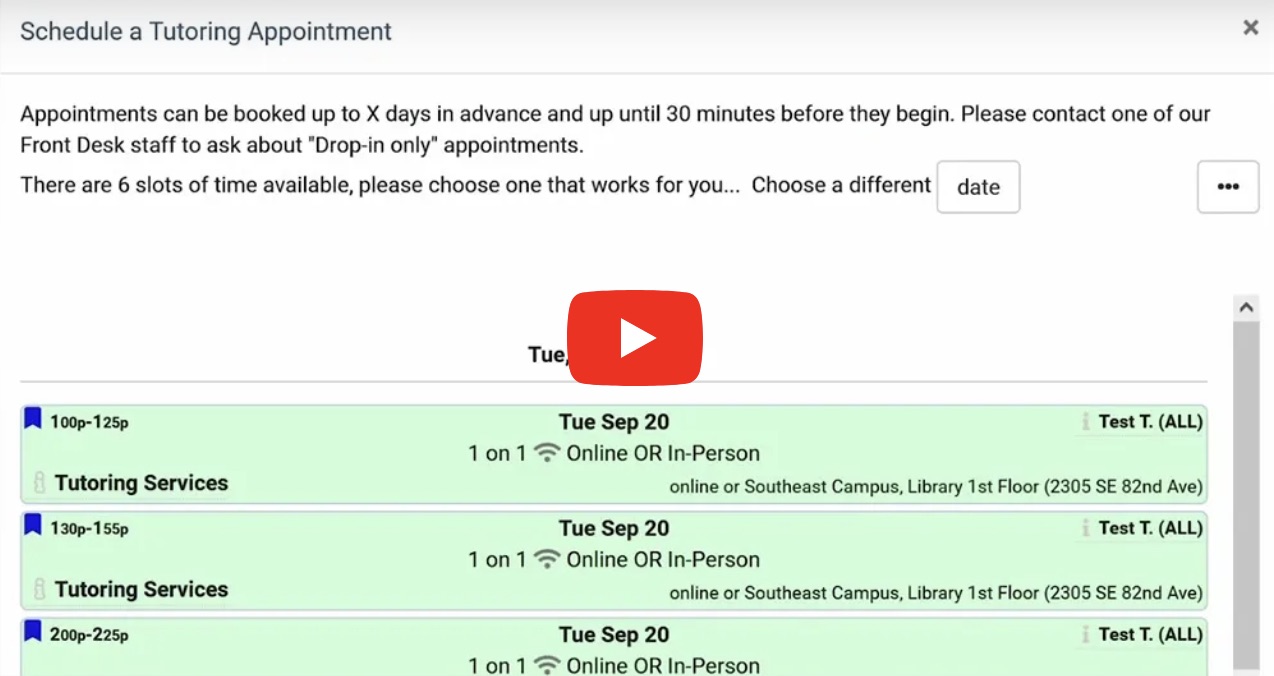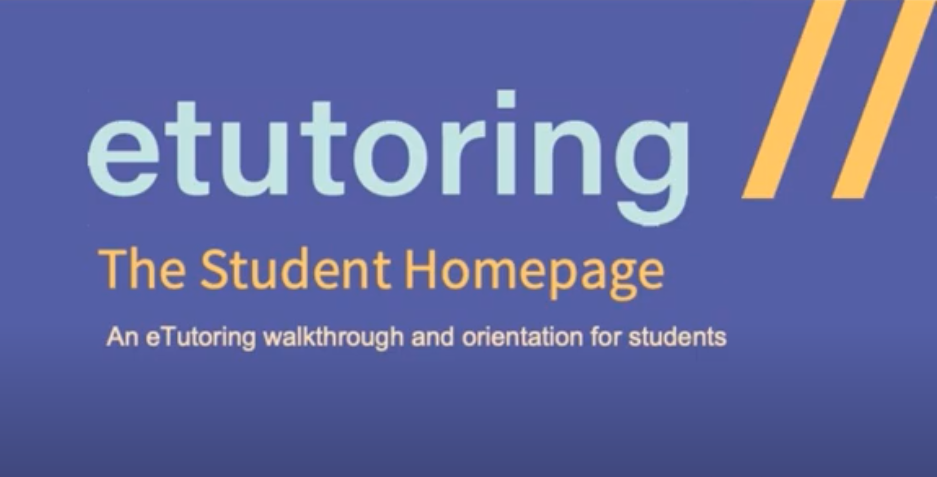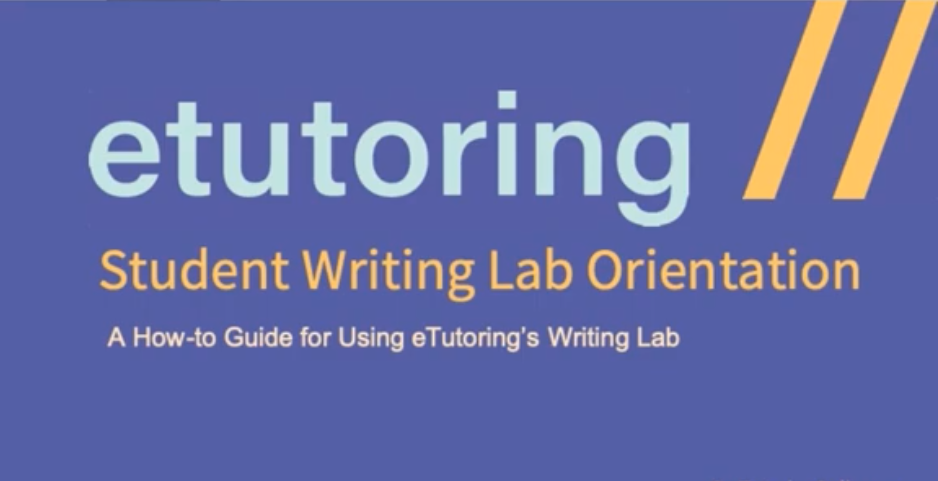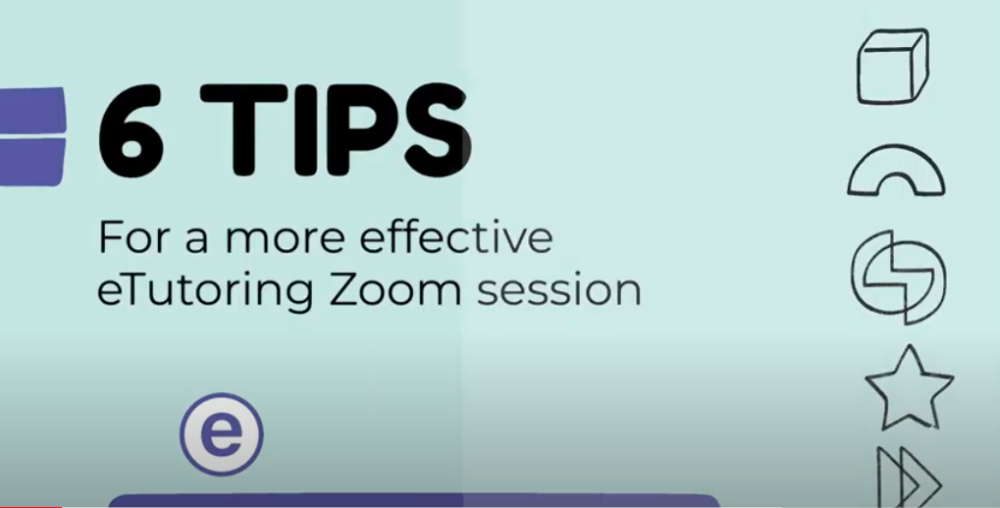Video guides and FAQs
FAQs
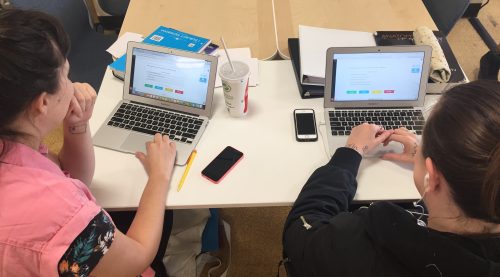
How do I make an appointment?
- Go to trac.pcc.edu
- Sign in with your PCC username and password
- Click “Schedule a Tutoring Appointment” on the PCC TracCloud homepage.
- Answer the questions on the 2 dropdown menus
- Choose a subject
- Choose a service / reason
- Choose “Reading & Writing” if you would like to meet with a Reading & Writing Tutor for reading or writing support in any subject area other than ESOL
- Choose “Tutoring” for all other support, including for all types of ESOL support
- To schedule your appointment, choose the date and time.
- To make an IN PERSON at a campus appointment: Click “Confirm”
- To make an ONLINE appointment: Check the “Online” box and the “Confirm”
- You will get an email to your PCC email with the date, time, and location (campus center or Zoom link).
Do you have tutoring in (subject)?
PCC tutoring services are available in over 50 subject areas. Please refer to the PCC public schedule or eTutoring schedule to see if your course is supported.
Are there any time limits to tutoring? Why?
Yes, tutoring is designed to support good study habits and facilitate learning rather than focus on assignment completion. Session lengths are based on the average time it takes to tackle one aspect of a writing assignment or one homework question.
Drop-in support: students can expect to work with a tutor for 15-20 minutes at a time before the tutor will allow the student to work on their own and utilize their new knowledge or skills. Drop in hours and subjects are available as noted in our public schedule.
Appointments: Reading and Writing appointments are 30 minutes each. All other subjects are available for 25 minute sessions. Students may schedule up to 3 tutoring appointments per subject, per week in any of our PCC centers. Be sure to read our cancellation policy and attend appointments as scheduled.
If my tutor doesn’t have another appointment, can I ask another question?
Our tutors can be very busy and are required to take scheduled breaks during their work shifts. However, students are welcome to check in with their tutor, and if time and need permits, a tutor may be able to continue tutoring a bit longer.
How do I get extended time?
The session times are designed to support student-directed learning around one concept or question, or to support with one paper or reading assignment. To make the most of your time with a tutor, be sure to prepare for your tutoring appointment. Students may schedule up to 3 tutoring appointments per subject, per week in any of our PCC centers. Beginning Fall 2023, students are able to book 2 of those tutoring sessions back-to-back through trac.pcc.edu. There is no limit to the number of drop-in tutoring sessions a student may use each day, pending subject availability and time constraints based on first come, first serve student demands.
What happens if I can’t make it to an appointment?
Our appointments can sometimes be in high demand. Students are responsible for attending any scheduled appointments. If you’ve booked a tutoring appointment and cannot attend, you can cancel your appointment through TracCloud. Multiple No Show appointments (scheduled sessions that are not attended and not canceled in advance) have a negative impact on tutor availability and will result in a pause in your ability to book future appointments. Drop-in sessions will continue to be available.
How do I cancel an appointment?
Use your MyPCC username and password to log in to our appointment platform (TracCloud). On the right side of the page, look for the yellow box listing your upcoming appointments. Click on the X in the top right corner of the yellow box. Click Confirm Cancelling Appointment. Thank you for releasing your reservation so other students can schedule or connect with a tutor in the center.
Why do you open week 2?
The first week of an academic term often involves scheduling changes for tutors and students. We encourage students to use this time to build study plans and identify tutoring needs. The Tutoring Schedule is posted during week 1 and students can begin making appointments week 1 once they identify a need. Students are also welcome to join drop-in virtual tutoring through our partner organization the Western eTutoring Consortium during week one.
Are you open for exam week?
All students are encouraged to join drop-in virtual tutoring through our partner organization the Western eTutoring Consortium for any last minute questions during exam week. Science tells us that cramming does not lead to long-term knowledge retention and skill development, and it can be bad for your health. We encourage students to plan regular study sessions, including working with a tutor, throughout the term.
I was hoping to work with a few other people from my class. Is this possible?
Of course! Just let the folks at the front desk know you’ll have people joining you and we’ll be sure to direct them to the same table as you during our open hours.
None of the hours available are convenient to my schedule. Are there any other options?
We plan our open times to correspond with when students have visited us in the past, and based on tutor availability. Each term we adjust our hours to try to maximize the benefit to students. If you need access to tutoring outside of our campus hours, please visit our online drop-in tutoring partners at the Western eTutoring Consortium for extended hours, including weekends.
How can I access the Western eTutoring Consortium and how does it work?
PCC, along with several other colleges, have an online drop-in tutoring platform where students registered for credit classes can meet with tutors through Zoom. View the eTutoring schedule and access eTutoring with your MyPCC username and password. Students meet with tutors in a Zoom room with up to 3 other students on a first come, first serve basis. Sessions are designed to support each student with one concept or question and you can return to the queue for support with additional questions.
How much does tutoring cost?
You’ve already paid for tutoring as part of your tuition! There’s no additional charge to use the service through any of our available modalities as many times as you’d like throughout the term. We want everyone to use it often!
I have more questions about tutoring! How can I reach someone in Tutoring Services to get my questions answered?
You are always more than welcome to join our Zoom room, stop by one of our four campus centers, or call us at 971-722-1555 for help during our hours of operation to talk with any of our staff at the front desk. You can also email us at tutoring-admin@pcc.edu.
I missed a class. Can I use tutoring to catch up?
PCC Tutoring Services are designed to support questions based on homework, reading, or writing assignments for PCC coursework after students have attended class. As tutoring is not a replacement for missing class, students are encouraged to connect with their instructors during office hours for missed instruction. For guidance on how to efficiently read a textbook for academic learning, consider booking an appointment for reading support with an RWC tutor.
Can my tutor help with a take-home or open-book exam?
Tutors cannot assist students with quizzes, tests, exams, or other types of course activities that require students to demonstrate their own comprehension or understanding of course material unless assistance has been explicitly approved by the instructor(s) on the original paperwork.
What is the Student Learning Center (SLC)?
The Student Learning Center, or SLC, is the name of the main tutoring center location on each campus. Tutors meet with students to clarify and review concepts taught in class, explain processes and help students solve specific problems. This is the space to get support with course content questions. Ask the front desk staff for information about what learning tools might be available to borrow, such as noise-canceling headphones for solo study, calculators, headsets, or webcams. Computers are available for student use. See campus locations for more information.
What is the Reading and Writing Center (RWC)?
The Reading and Writing Center (or RWC) is where tutors assist students with any reading or writing task (papers, essays, etc.) for any subject. Here you can get support with reading textbooks for knowledge gain, figuring out if you have a strong thesis, how to create an outline, or get answers to your questions about various writing formats (APA, MLA, etc.). On Southeast, Sylvania, and Rock Creek campuses, the Reading and Writing Centers are located within Student Learning Centers. On Cascade campus, the Reading and Writing Center is located in the same building as the SLC. See campus locations for more information.
What is the Science Tutoring Lab (STL)?
The Science Tutoring Lab exists on Cascade campus and is the dedicated space for science tutoring. It operates in the same manner as the Student Learning Center but is located on the other end of the building. On Southeast, Sylvania, and Rock Creek campuses, sciences are supported in the Student Learning Centers. See campus locations for more information.
How to prepare for an exam
On the day of the test
- Be sure to be prepared physically. Do your best to get rest the night before.
- Give yourself more time than usual to get to class and test technology. Anxiety over technical issues will heighten test anxiety.
- Prior to class, remind yourself of acronyms, acrostics, formulas, mnemonics. Then take a few minutes to relax and breathe. Use relaxation techniques if necessary.
- Visualize crushing the test. Change your frame of reference. Look at the test as a challenge to see how well you’ve prepared for the test, to show how much you’ve learned and how hard you’ve worked.
When you get to the test
- Scan through the entire test. Are there essay questions? How long will they take you? Budget your time. How much is each section worth? If essay questions are only worth 20%, don’t spend 80% of your time on them.
- Write down any difficult information you might forget: formulas, outlines, facts – Do this in the margins.
- Then read the directions – slowly. Nothing is worse than knowing the information and getting it wrong on the test because you weren’t careful with your directions.
- Answer the easiest questions first. This gives you the experience of success and stimulates connections.
- Next answer multiple choice, T/F, fill in the blank. Proceed to short answers and finally essays.
- Pace yourself – expect memory blocks, if you’re stuck, mark it, go on and come back to it.
- Look for answers on other test questions.
- Answer every question – make your best guess if wrong answers are not penalized.
- Work at your own pace. Do not be concerned when other students finish and leave before you do.
- If time permits, review questions and answers. Remember, your first test response is generally your best.

